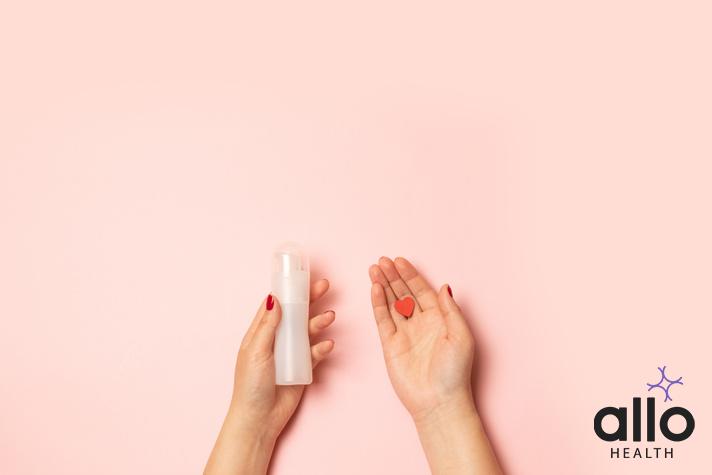How to Do Self Sex?

Allo Health is dedicated to personalized well-being, offering support and trusted information tailored to individual health goals. The platform emphasizes human-generated content, led by a distinguished medical team of experts, including physicians and sexual health specialists. Their commitment to credibility involves rigorous fact-checking, authoritative research, and continuous updates to ensure accurate, up-to-date information. Allo Health's unique approach goes beyond conventional platforms, providing expert-led insights and a continuous commitment to excellence, with user feedback playing a crucial role in shaping the platform's authoritative voice.

Dr. Aswathi P T earned her MBBS degree and completed her internship at Government Medical College, Kozhikode, and possess diverse professional background spanning 3.5 years. Her experience includes a wide range of healthcare settings, including health centers, hospitals, and teleconsultation services.
Why This Was Upated?
Our experts continually monitor the health and wellness space, and we update our articles when new information became available.
Updated on 10 April, 2024
- Article was updated as part of our commitment to diversity, equity, and inclusion.

"The following blog article provides general information and insights on various topics. However, it is important to note that the information presented is not intended as professional advice in any specific field or area. The content of this blog is for general educational and informational purposes only.
Book consultation
The content should not be interpreted as endorsement, recommendation, or guarantee of any product, service, or information mentioned. Readers are solely responsible for the decisions and actions they take based on the information provided in this blog. It is essential to exercise individual judgment, critical thinking, and personal responsibility when applying or implementing any information or suggestions discussed in the blog."
When it comes to exploring your own body and experiencing sexual pleasure, self sex – also known as masturbation – can be an incredibly empowering and fulfilling experience. However, many people may feel unsure or embarrassed about how to engage in self sex and may not be fully aware of all the potential benefits and techniques involved.
In this step-by-step guide, we will cover everything you need to know about self sex, from preparing yourself for the experience, to tips and tricks for achieving maximum pleasure, to debunking common myths and sharing your experiences with your partner.
Benefits of Masturbation (Self Sex)
Masturbation has a variety of physical, emotional, and psychological benefits.
- Not only is it a safe and healthy way to experience sexual pleasure, but it can also help to reduce stress and anxiety, improve self-esteem and increase body confidence, and even promote better sleep.
- Masturbation is positively linked to better mental health.
- Many people also find that engaging in self sex can help them better understand their own bodies and desires, leading to more fulfilling sexual experiences overall.
- By prioritizing your own pleasure and taking control of your sexual experiences, you can create a more positive and empowering relationship with your sexuality.
- Masturbation can be a great way to explore and experiment with different fantasies and desires in a safe and private setting. It allows individuals to try new things without the pressure or judgment of a partner, and can ultimately lead to a better understanding of one’s own sexual preferences.
- It can also help to strengthen pelvic floor muscles, which can improve bladder control and prevent urinary incontinence.
- It can also increase blood flow to the genital area, which can improve overall sexual function and reduce the risk of erectile dysfunction in men.
Tips and Tricks for Masturbation
- When it comes to self sex, the key is to create a comfortable and relaxed environment where you can fully focus on your own pleasure.
- Start by finding a private and quiet space where you won’t be interrupted, and set the mood with candles, music, or other sensory elements. Lay down in a comfortable position.
- You may also want to take some time to explore your body beforehand, using your hands or a mirror to better understand your anatomy and what feels good.
- Using a consistent rhythm or stroke can help build up sexual tension, while incorporating deep breathing or visualisation can help to deepen your sense of pleasure. Experimentation is key – try out different techniques and see what works best for you.
- Finally, make sure you have all the necessary tools on hand, such as lubrication or toys, to enhance your experience.
It’s important to remember that masturbation is a completely normal and healthy form of sexual expression. It can help you learn more about your own desires and preferences, and can even improve your sexual experiences with a partner.
Don’t be afraid to experiment and try new things, and always prioritise your own comfort and feelings of pleasure.
Remember, masturbation is all about you and your own satisfaction.
Exploring Your Body: What To Do?
One of the most exciting aspects of masturbation is the opportunity to explore your own body and discover what feels good to you.
- Start by experimenting with different techniques and movements, such as stroking, rubbing, or tapping various erogenous zones.
- You can also try using different types of stimulation, such as pressure or vibration, to find what works best for you.
- Don’t be afraid to mix things up or try new positions as well – self sex is your chance to be creative and explore on your own terms.
- Another important aspect of self-discovery is understanding your own sexual preferences and desires. Take the time to explore your fantasies and what turns you on. This can involve reading erotic literature, watching porn, or simply fantasising on your own.
- By understanding your own desires, you can better communicate them to future partners and have more fulfilling sexual experiences.
- Prioritise your own pleasure and satisfaction during masturbation. This means taking the time to focus on yourself and your own needs, rather than feeling pressure to perform or meet someone else’s expectations.
Different Types of Orgasms
Orgasms are more than just the ultimate goal of masturbation – they are complex and multi-faceted experiences that can vary in intensity, duration, and sensation.
- Clitoral orgasm: A clitoral orgasm is a type of sexual climax primarily achieved through stimulation of the clitoris, a highly sensitive organ located at the external part of the female genitalia.
- Vaginal orgasm: A vaginal orgasm refers to the experience of sexual pleasure and climax that arises primarily from stimulation of the vaginal area, particularly the G-spot.
- Anal orgasm: An anal orgasm is a type of sexual climax that is achieved through stimulation of the anal area. This can be achieved through various means, such as manual stimulation, the use of sex toys, or during anal intercourse.
To achieve the best possible orgasmic experience during self sex, it’s important to understand your own body and what types of stimulation work best for you.
Challenges You May Face:
While masturbation is a wonderful and fulfilling experience, it can also come with its own set of challenges and obstacles.
- One common concern many people face is difficulty becoming aroused or achieving orgasm, especially if they have underlying medical or psychological factors at play.
- Some people may also struggle with feelings of guilt or shame around engaging in masturbation, which can impact their confidence and enjoyment.
- If you’re experiencing any of these challenges, know that you’re not alone – there are many resources and techniques available to help you overcome these obstacles and fully enjoy your sexual experiences.
Incorporating Toys and Props into Your Self Sex Routine
- Sex toys and other props can be a fun and exciting way to enhance your self sex experience.
- Whether you’re using a vibrator, a dildo, or other types of toys, it’s important to choose items that are safe, comfortable, and enjoyable to use.
- Many people find that incorporating toys allows them to explore new types of stimulation or intensify their pleasure in unique ways.
- Just remember to use lubrication as needed and to clean your toys thoroughly between uses.
Hygiene During Masturbation
To maintain hygiene during masturbation, it’s important to follow some basic steps. Keep in mind that I’ll provide this information in a neutral and informative tone, as per your preference:
- Clean hands: Before engaging in any intimate activity, ensure that your hands are clean. This helps prevent the transfer of bacteria.
- Choose a clean environment: Find a comfortable and clean space where you won’t be disturbed.
- Personal hygiene: It’s advisable to maintain regular personal hygiene practices, including regular showers and washing of intimate areas.
- Use lubrication: If needed, opt for water-based lubricants to enhance comfort and reduce friction.
- Clean sex toys: f you’re using any sex toys, make sure to clean them before and after each use, following the manufacturer’s instructions.
- Avoid harsh soaps: When cleaning intimate areas, it’s best to use mild, fragrance-free soaps to avoid irritation.
- Change bedding regularly: If you masturbate in bed, ensure that your bedding is changed regularly to maintain cleanliness.
- Avoid unsanitary objects: Be cautious about using objects that may not be clean or safe for intimate use.
Remember, maintaining good hygiene practices is not only important for comfort but also for overall health and wellness.
How Often Should You Engage in Self Sex?
- There’s no “right” amount of self sex to engage in – it all depends on your individual preferences and needs.
- Some people may choose to engage in self sex daily, while others may only do it occasionally.
- However, it’s important to prioritize your own pleasure and sexual health, and to make sure that masturbation is not interfering with other aspects of your life, such as work or relationships.
Debunking Myths About Masturbation
Unfortunately, there are many myths and stereotypes surrounding self sex and masturbation, particularly when it comes to female sexuality.
Some people may believe that masturbation is harmful, unnatural, or a sign of sexual deviance. However, none of these beliefs are true – masturabation is a healthy and natural way to explore and celebrate your own sexuality, regardless of your gender.
Debunking these myths and promoting accurate information about masturbation can help to reduce stigma and promote positive attitudes towards sexuality.

Key Takeaways
- Self sex is otherwise known as masturbation.
- Masturbation has a variety of physical, emotional, and psychological benefits.
- Prioritise your own pleasure and satisfaction during masturbation.
- Some people may also struggle with feelings of guilt or shame around engaging in masturbation.
- Masturbation is a healthy and natural way to explore your own sexuality
- There’s no “right” amount of self sex to engage in – it all depends on your individual preferences and needs
Frequently Asked Questions
Q: What is Masturbation?
A: Masturbation is the act of stimulating one’s own sexual organs for sexual pleasure or arousal.
Q: Is Masturbation Normal?
A: Yes, masturbation is a normal and healthy part of human sexuality. It is a common way for people to explore their own bodies and experience sexual pleasure.
Q: Are There Any Health Benefits to Masturbation?
A: Masturbation can have some health benefits. It can help relieve stress, improve sleep, and promote a sense of well-being. It may also have positive effects on sexual function.
Q: Can Masturbation Affect Sexual Performance?
A: Generally, regular masturbation is not known to negatively affect sexual performance. In fact, it can help individuals become more familiar with their own bodies, which can enhance sexual experiences with a partner.
Q: Is Masturbation Safe?
A: Yes, masturbation is considered a safe and healthy sexual activity. It doesn’t carry any risk of sexually transmitted infections (STIs) or unwanted pregnancies.
Q: Can Masturbation Cause Sexual Dysfunction?
A: In most cases, masturbation is not a cause of sexual dysfunction. However, if someone is experiencing persistent sexual problems, it’s advisable to consult a healthcare professional.






































